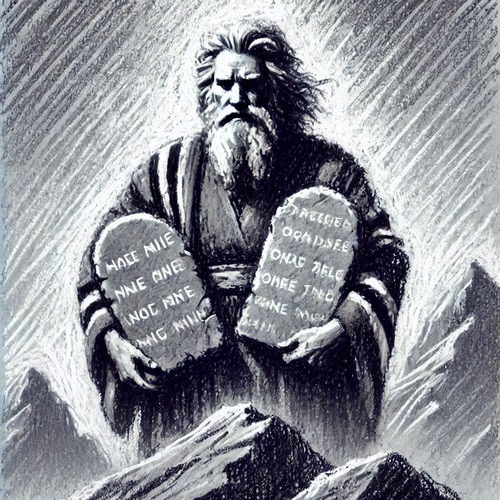Moral Law Before Moses: How Did People Know Right from Wrong?
The Ten Commandments are a cornerstone of Christian morality, but they didn’t appear until Moses received them on Mount Sinai. This raises an important question: How did people before Moses know right from wrong? From a Reformed perspective, the answer lies in understanding the eternal nature of God’s moral law, which transcends time and culture.
The Eternal Nature of God’s Moral Law
God’s moral law isn’t limited to the Ten Commandments or confined to specific periods of history. It’s a reflection of His unchanging character. Scripture teaches us God is the same yesterday, today, and forever (Malachi 3:6; James 1:17). His standards for righteousness, rooted in His holy nature, have always existed. The Ten Commandments are a specific expression of this universal and eternal law, adapted to the covenantal relationship between God and Israel.
Moral Law Before Moses: Written on the Heart
The apostle Paul provides a crucial insight into how people before Moses understood morality. In Romans 2:14-15, Paul explains even Gentiles, who didn’t have the Mosaic law, acted according to God’s moral standards because the law was written on their hearts. Their conscience bore witness to their actions, either accusing or excusing them.
The concept of the law written on the heart demonstrates God implanted a basic moral awareness in humanity from creation. Conscience serves as a testimony to this internalised law, holding all people accountable for their actions.
Examples of Moral Awareness in Pre-Mosaic Times
Several biblical accounts illustrate people before Moses had a clear understanding of right and wrong:
- Adam and Eve: After disobeying God, Adam and Eve experienced guilt and shame, evidenced by their attempt to hide from Him (Genesis 3:7-11). This shows an awareness of having violated God’s moral standard.
- Cain and Abel: When Cain murdered Abel, God confronted him, and Cain’s evasive response revealed his awareness of guilt (Genesis 4:9-10).
- Noah’s Generation: God judged the earth for its wickedness, which implies humanity was accountable to His moral standards (Genesis 6:5-13).
- Abraham: Abraham’s intercession for Sodom revealed his understanding of divine justice, as he appealed to God as the Judge of all the earth (Genesis 18:25).
These examples show that even without a formal written law, people were morally accountable to God.
God’s Direct Revelation to Humanity
Before the giving of the Ten Commandments, moral understanding was transmitted through oral traditions. God also often revealed His will directly to individuals. He spoke to Adam, Noah, Abraham, and others, providing specific instructions and holding them accountable. These divine revelations conveyed God’s moral standards and guided people in living righteously.
For example, Noah received explicit instructions on building the ark and God’s judgement on sin, demonstrating moral accountability existed well before Sinai. Similarly, Job, who lived during the patriarchal period, displayed a profound understanding of God’s justice and righteousness, even in the absence of the Mosaic law.
The Universal Testimony of Creation
In addition to the law written on the heart and direct revelation, creation itself testifies to God’s existence and His moral authority. Psalm 19:1-4 declares the heavens proclaim the glory of God. And Romans 1:18-20 tells us God’s invisible attributes are clearly perceived through what has been made.
This general revelation holds all humanity accountable, as it leaves no one with an excuse for ignoring God’s moral standards. Even without Scripture, creation declares enough about God’s nature to establish a basic framework for right and wrong.
The Purpose of the Ten Commandments
The Ten Commandments did not introduce a new morality. Rather, they codified eternal truths for Israel within the context of their covenant with God. They served several purposes:
- Revealing Sin: The commandments clarified what constitutes sin (Romans 7:7).
- Pointing to Christ: By highlighting human inability to keep God’s law perfectly, they pointed to the need for a Saviour (Galatians 3:24).
- Guiding Holy Living: They provided a moral framework for living in obedience to God.
The moral principles expressed in the Ten Commandments were already present in the hearts of humanity; the commandments simply made them explicit.
Christ and the Fulfillment of the Law
Jesus affirmed the continuity of God’s moral law. He said He came not to abolish the law but to fulfil it (Matthew 5:17-19). From Adam onward, all humanity has been accountable to God’s moral standards, which Christ fulfilled perfectly on behalf of believers. Through faith in Him, we are freed from the condemnation of the law and empowered by the Holy Spirit to live in obedience.
Conclusion
The question of how people knew right from wrong before Moses is answered by the eternal nature of God’s moral law. The law, written on the hearts of humanity, was evident in their conscience, revealed through creation, and communicated directly by God. The Ten Commandments didn’t create morality; they codified it for a specific covenantal purpose. Ultimately, this truth points us to the gospel: all humanity is accountable to God’s law, but Christ has fulfilled it perfectly on our behalf. As we reflect on this, let us rejoice in the unchanging character of God and His provision of grace through Jesus Christ.
Moral Law Before Moses—Related FAQs
How did people know right from wrong before the Ten Commandments? Before the Ten Commandments, God’s moral law was written on the hearts of all people (Romans 2:14-15). Conscience served as an internal guide, accusing or excusing actions based on this innate knowledge of right and wrong. Additionally, God revealed His moral standards directly through instructions to individuals like Adam, Noah, and Abraham, and through the universal testimony of creation (Psalm 19:1-4; Romans 1:18-20).
- Did God judge people for sin before the Ten Commandments were given? Yes, God did judge sin even before the Ten Commandments were written down. For example, He judged Adam and Eve for their disobedience, Cain for murdering Abel, and the entire world for its corruption in Noah’s time. These judgments show that God’s moral law existed from creation, holding humanity accountable for sin.
- Why did God wait until Moses to give the Ten Commandments? The Ten Commandments were given to formally codify God’s eternal moral law for Israel in the context of their covenant relationship with Him. They served as a written standard for holy living, revealed sin more clearly, and pointed to humanity’s need for a Saviour (Romans 7:7; Galatians 3:24). While the commandments were given at Sinai, the principles they contain reflect God’s unchanging character and were always binding.
- Did people before Moses have a sense of justice and morality? Yes, people before Moses demonstrated a clear sense of justice and morality. Cain knew it was wrong to kill his brother, Noah was described as righteous in his generation, and Abraham appealed to God as the just Judge of all the earth (Genesis 4:9-10; 6:9; 18:25). These examples highlight humanity’s innate understanding of right and wrong, rooted in the law written on their hearts.
Is the moral law still relevant today? God’s moral law is eternal and reflects His unchanging character, making it relevant for all time. The Ten Commandments remain a guide for holy living, though Christians now obey them in light of Christ’s fulfillment of the law (Matthew 5:17). Through the work of the Holy Spirit, believers are enabled to live in obedience, not out of fear of condemnation, but as an expression of gratitude for God’s grace.
Moral Law Before Moses—Related FAQs
- How Is Original Sin Transmitted? A Reformed Perspective
- The Imago Dei: What Does It Mean That We’re Made in God’s Image?
Editor's Pick
SUPPORT US:
Feel the Holy Spirit's gentle nudge to partner with us?
Donate Online:
Account Name: TRUTHS TO DIE FOR FOUNDATION
Account Number: 10243565459
Bank IFSC: IDFB0043391
Bank Name: IDFC FIRST BANK






